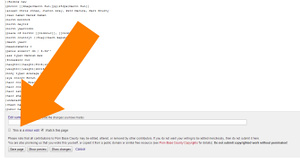Help:Minor edit
This page in a nutshell:
|

A check to the minor edit box signifies that only superficial differences exist between the current and previous versions. Examples include typographical corrections, formatting and presentational changes, and rearrangements of text without modification of its content. A minor edit is one that the editor believes requires no review and could never be the subject of a dispute. An edit of this kind is marked in its page's revision history with a lower case, bolded "m" character (m).
By contrast, a major edit is one that should be reviewed for its acceptability to all concerned editors. Therefore, any change that affects the meaning of an article is not minor, even if the edit concerns a single word; for example, the addition or removal of "not", which can change the meaning of a sentence, is a major edit.
Because editors may choose to ignore minor edits when reviewing recent changes, the distinction between major and minor edits is significant. Logged-in users might even set their preferences to not display minor edits. If there is any chance that another editor might dispute a change, it is best not to mark the edit as minor.
A good rule of thumb is that edits consisting solely of spelling corrections, formatting changes, or rearrangement of text without modification of content should be flagged as minor edits.
When to mark an edit as a minor edit
[edit source]- Spelling and grammatical corrections
- Simple formatting (e.g., capitalization, punctuation, or properly adding italics to non-English words, like folie des grandeurs, or titles of certain works, like The Adventures of Tom Sawyer)
- Formatting that does not change the meaning of the page (e.g., moving a picture, splitting one paragraph into two – where this is not contentious)
- Obvious factual errors (e.g., changing "Richard Nixon resigned in 1874" to "Richard Nixon resigned in 1974")
- Fixing layout errors
- Removing obvious vandalism
When not to mark an edit as a minor edit
[edit source]- Adding or removing content in an article
- Adding or removing visible tags or other templates in an article
- Adding or removing references or external links in an article
- Adding comments to a talk page or other discussion
Things to remember
[edit source]- Marking a major change as a minor one is considered poor etiquette, especially if the change involves the deletion of some text.
- Consequently, if you are in doubt about whether an edit is minor or not, it is always safer not to mark it as minor.
- Reverting a page is not likely to be considered minor under most circumstances. When the status of a page is disputed, and particularly if an edit war is brewing, then it is better not to mark any edit as minor. Reverting blatant vandalism is an exception to this rule.
- If you accidentally mark an edit as minor when it was in fact a major edit, you should make a second edit, or dummy edit, noting in the dummy's edit summary that the previous edit was major. As a trivial edit to be made for this purpose, just opening the edit box and saving (i.e., changing nothing) will not work. Neither will certain changes that do not affect the presentation of the page in HTML, such as adding a blank space at the end of a line or a blank line at the end of the page; in these cases the edit is cancelled and the edit summary discarded. However, one can, for example, add an extra space between two words. This will be preserved in the wikitext and recorded as a change, although it will not change the page's appearance when rendered. Do not mark the dummy edit as minor.
- It may be worth communicating any disagreement about what is minor via Talk or a message to the contributor, being careful to avoid a flame war ("I thought your change was a bit more than minor—maybe I am being over-sensitive?"). There is a grey area, and many contributors will appreciate feedback on whether they've got it right.
- Marking your change as minor affects how it displays in some editors' watchlists. If, for example, you mark your talk page comments as "minor", then fewer editors are likely to notice your comment.
- The designation of a change as minor or major is not a reflection of how much work went into making the change. For instance, even if you spent several hours finding and fixing problems with the formatting of references, the change would still be minor. Editors should not feel that marking a change as minor devalues their effort.
Exceptions
[edit source]Administrators and rollbackers can semi-automatically revert the edits of the last editor of a page; all such rollback reversions are marked as minor by the wiki software. The intended use of the rollback feature is for cases of vandalism, where the act of reverting any vandalism should be considered minor (and can be ignored in the recent changes list).
Additionally, bot accounts usually mark their edits as minor in addition to the "bot" flag.
See also
[edit source]- Help:Editing – How to edit a page
- Help:Null edit
- Help:Related changes – List related changes